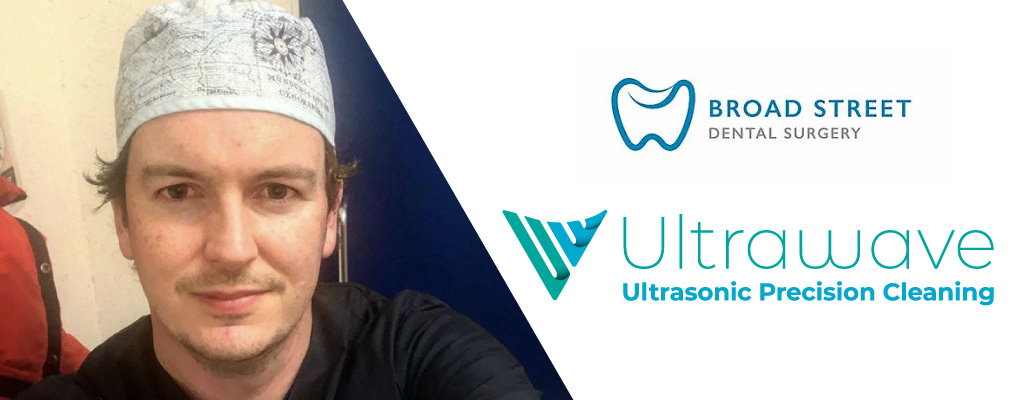Home » Q&A with Andrew Farr, Broadstreet Dental Practice | Ultrawave
Q&A with Andrew Farr, Broadstreet Dental Practice | Ultrawave

As businesses reopen following the Covid-19 lockdown and adapt to a whole new way of working, business owners are feeling the pressure of ensuring that they have all necessary measures in place to keep both their staff and customers safe.
We caught up with Andrew Farr, Principal Dentist at Broadstreet Dental Surgery, to find out how the pandemic has impacted the dental industry, what his experience of reopening has been and what methods he is using to ensure his practice is safe.
How long have you had your practice?
“I’ve been at the practice for six years, but we officially purchased it in January, just before the pandemic.”
How has the dental industry been affected by the pandemic?
“It has affected the dental industry quite badly. When we were in complete lockdown, we couldn’t see any patients which left many people in difficult situations not being able to receive treatment. We tried our best to provide prescriptions of antibiotics remotely and made homemade temporary filling kits that we sent out in the post.
“Now that we have reopened, we are trying to clear the backlog of appointments which is proving tricky as we have to factor in fallow time between appointments which has really delayed the number of patients we can see. We also have the added cost of PPE to factor in.”
Now that lockdown restrictions have eased, are you back open as you were before the pandemic? If not, how are things different?
“We aren’t running anywhere near as we were before the pandemic. This morning we could only fit in four patients and that was just for normal filling appointments. We’re fortunate that on Fridays we have a spare surgery that we can use in between the fallow time. But currently we are only able to accommodate 50% of the number of patients that we would usually be seeing”
As you prepared to reopen, what obstacles did the virus present? And what concerns did you have?
“My main concern was keeping our staff safe, so we immediately installed screens and purchased new PPE, which proved tricky to get hold of for a while! Our next task was trying to work out how to keep patients safe so we started with new screening questionnaires and temperature checks, we installed a one way system and ensured the practice allowed people to observe social distancing.”
What measures have you introduced to ensure your surgery is clean and hygienic?
“We’ve always carried out cross-infection protocols, so we’re used to maintaining good hygiene standards. Now we are being even more meticulous with cleaning in between patients and allowing extra time for cleaning and sterilisation. Our ultrasonic cleaner was already providing us with the best sterilisation method so we haven’t needed to change that and we have a separate decontamination room that deals with bacterial threats.”
What ultrasonic cleaning products are you using?
“We are using the Ultrawave Hygea and Sonozyme 3.”
How has ultrasonic cleaning benefitted you?
“It really speeds up the decontamination process and our staff don’t have hand scrub equipment, so it removes a phase of the process and reduces the risk of needle injuries. The machine isn’t just doing the job of cleaning either, because it’s digital it keeps a really good record of the cleaning processes for clinical governance, auditing, and cross infection protocols.”
How does it compare to other cleaning methods you have used?
“We did plan originally to get a washer disinfector, but we didn’t think it was worthwhile investment compared to the ultrasonic cleaner. The quality is there, it meets all our needs and we have records to back that up. The reliability of the ultrasonic cleaner is great, I’ve worked in other places that have had issues with washer disinfectors and they take a lot of time, the ultrasonic cleaner is far more efficient.”
Would you recommend it to others in the industry?
“Oh yes I would definitely recommend, especially the particular unit we have. When it’s serviced it records the tests that we need which is a much better method than our staff taking the time to do the old fashioned method of foil tests, it’s just so efficient and reliable.”
Do you think the pandemic will have a long-term impact on the dental industry? If yes, how?
“Yes, it is going to have a long-term impact. It is going to take quite some time for things to settle. I doubt we will get back to same level of patient turnover that we were pre-lockdown. I’m hoping that the fallow time will reduce at some point, but if it doesn’t it could be quite catastrophic for some practices who rely on high turnover of patients. However, our staff have really pulled together to keep us going and we appreciate their efforts so much.”

